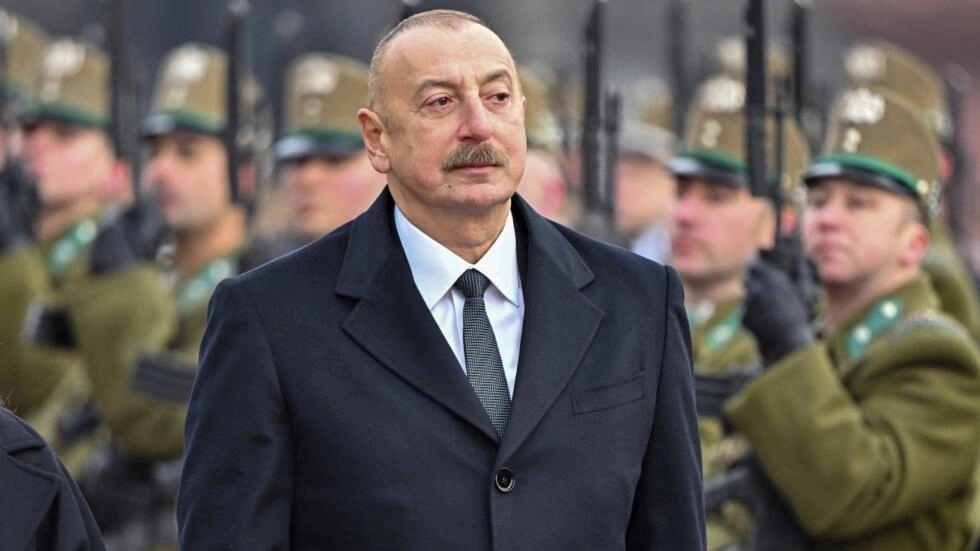Blinked stressed the determination of the Biden Administration by highlighting the possibility of halting US military aid to Azerbaijan in his meeting with lawmakers.These remarks came after the mass exodus of the ethnic Armenians living in the Nagorno-Karabakh region, Artsakh, fearing persecution following the military operation led by Azeri forces last month leaving hundreds dead and wounded. The operation took place almost three years after the six-week armed conflict which caused Azerbaijan to claim back territories in the region.
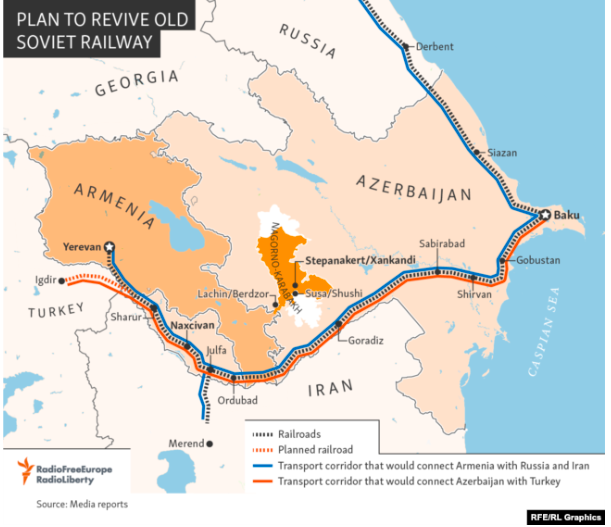
Photo credit: RFE/RL Graphics
The Geostrategic Importance of Zangezur
The Zangezur Corridor would link Turkey and Azerbaijan via the Nakhchivan Autonomous Republic exclave bordering Turkey in the west, Armenia in the east and north, and Iran in the southwest. It corridor would act as a connection corridor uniting the Turkic-speaking people in the region. This project would also enable Azerbaijan to access the Nakhchivan exclave without the Armenian checkpoints. The only way to initiate this plan without the approval of Armenia is to do it “by force” as described by the Azerbaijani President Aliyev in his interview in April 2021. Once initiated forcefully, the invasion would concern the southern parts of Armenia which are known as the “Syunik” province with a total of around 4500 kilometre square area and 140,000 inhabitants.
Why Does Azerbaijan Insist On This Corridor?
The Azeris base their claims to open this corridor on the 9th clause of the Ceasefire Agreement between Azerbaijan, Armenia, and Russia as the guarantor of the agreement benefitting from the conflict by positioning Russian “peacekeepers” in the region. The 9th clause suggests that the implementation of the ceasefire agreement could foresee new transport structures and links in the region. It says: “All economic and transport connections in the region shall be unblocked. The Republic of Armenia shall guarantee the security of transport connections between the western regions of the Republic of Azerbaijan and the Nakhchivan Autonomous Republic in order to arrange unobstructed movement of persons, vehicles and cargo in both directions…” However, this clause does not mention a “Zangezur Corridor” specifically.
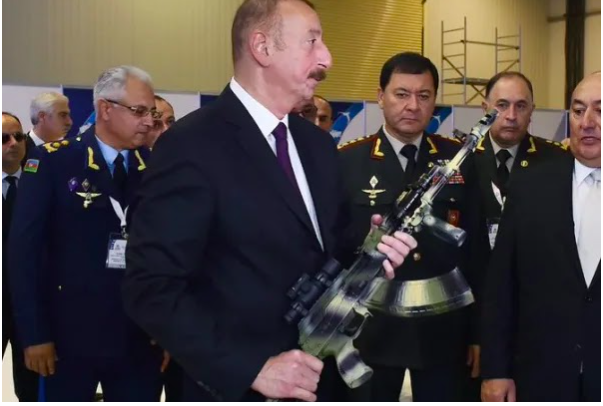
Photo Credit: President.az
The Azeri President Aliyev has been using this term despite this fact. He previously acknowledged that this corridor is not involved in the clause yet insists on referring to it. “Yes, I added that term to the geopolitical vocabulary later… It is a strategic plan for us, and not only for us…” says Aliyev. This project dates back to even before the Ceasefire Agreement of 2020. This corridor has been in the political rhetoric way before when the conflict broke out following the military operation of Azerbaijan against Armenia in 2020. The Azeri President and Turkish President have long been the supporters of this project as part of their pan-Turkish foreign policies and claims over the region which ignores the existence of the ethnic Armenians living in the region by majority. These policies were materialized in “Shusha Declaration on allied relations between the Republic of Azerbaijan and the Republic of Turkey” in 2021 which strengthened the bilateral ties between strategic allies. It also highlighted the “Zangezur Corridor” as well as numerous cooperations and projects of financial interest.

Photo credit: Mary Asatryan
Lemkin Institute for Genocide Prevention also opposed the possible corridor claiming that it could cut Armenia off from its land making it even more vulnerable to further conflicts. This “Red Flag Alert for genocide” by the Institute came after the illegal blockade of the Lachin Corridor by Azerbaijan which resulted in a massive humanitarian catastrophe for the ethnic Armenians of around 120000 people who lacked food, medicine, hygiene products, gas and electricity leaving them desperate and stuck in the Artsakh. The latest “Red Flag Alert” from the Institute on the possibility of an invasion of Armenia by Azerbaijan also intensifies the worries which were voiced by several politicians in the US, the Secretary of State and the Armenian Ambassador to the EU Tigran Balayan who has expressed his country’s concerns over an Azeri invasion “within weeks”.
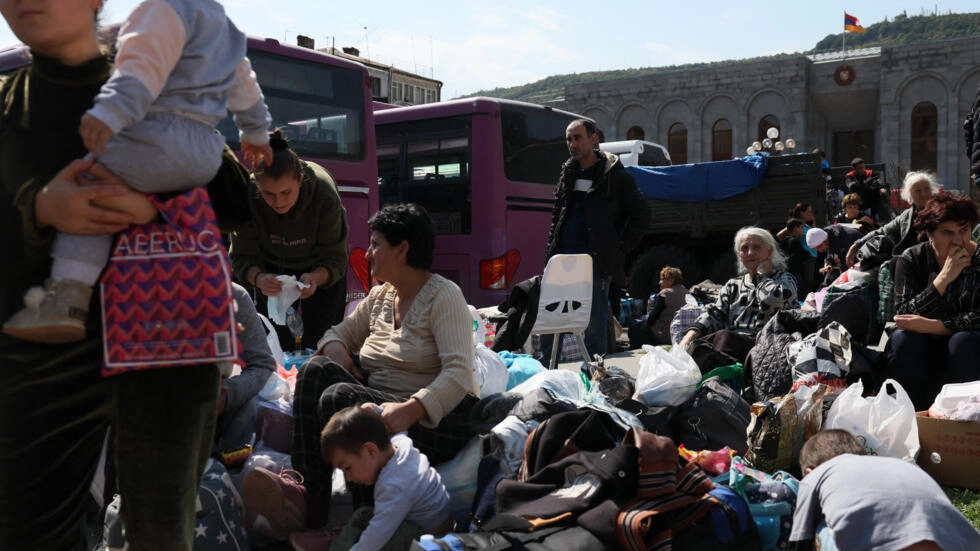
Photo credit: AFP / ALAIN JOCARD
Ankara’s Push vs Tehran’s Reluctance Towards the Corridor
The economic prospects of the Turkish side as one of the forerunner advocates of this “project” conflict with the Iranian veto. Iran has outspokenly declared their unwillingness to back the corridor fearing that having new trade roads and actors in the region might weaken its geostrategic position due to the loss of its land path with Armenia. According to BBC Monitoring Services, the Iranian side has clarified its opposition to the corridor by scrutinizing the Turkish intention towards the Caucasus through its newspapers as well as reflecting their concerns vis-à-vis their counterparts. However, Turks who have been the biggest military and strategic supporter of Azerbaijan are very committed to the project due to the financial benefits on its economy which is trembled by hyper-inflation and political unrest once the corridor is opened and functioning. The military exports to Azerbaijan rose 600% in 2020 exceeding 250 million dollars. In addition, the Shusha Declaration envisages further military cooperation including interaction capabilities of the armed forces, joint military exercises and creation of production industries. On October 23, Turkey and Azerbaijan had a two-day joint military exercise in Baku, Nakhchivan and other regions which were seized from Armenia with 3000 military personnel.
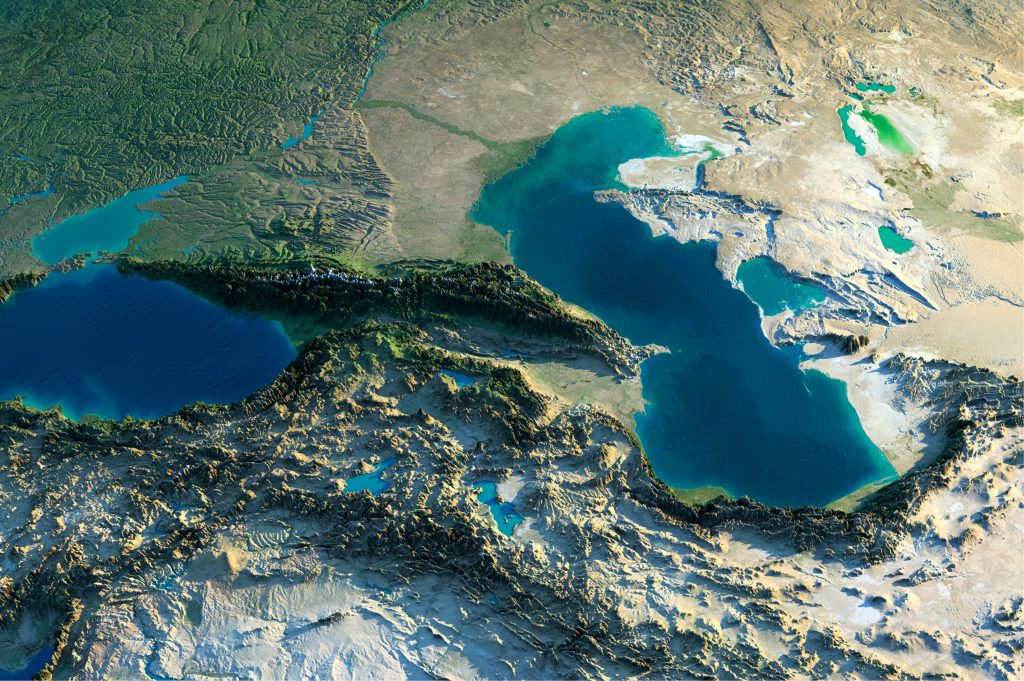
Photo Credit: Unknown
Source: https://www.atlanticcouncil.org/blogs/energysource/us-foreign-policy-and-euro-caspian-energy-security-the-time-is-now-to-build-the-trans-caspian-pipeline/
The benefits of such a corridor are not limited to trade for Turkey since it would have strategic gains due to numerous infrastructure projects and partnerships including the modernization of the Kars-Gyumri Railway. This corridor would also provide political gains by serving the domestic audience for the Turkish President who was re-elected on a 3rd term by a margin of less than 5% against his main rival in a divisive election campaign as his voter base would approve these attempts. Zangezur’s corridor as a transit hub linking Europe to Asia is also a reference to the Turkish agenda of neo-Ottomanism and Eurosianism where they often refer its bilateral ties with Azerbaijan as “One nation, Two States”. Analysts agree on the destructive impact of clashing interests of regional partners seeking even more influence at the cost of further conflicts including Iran and Turkey in the Caucasus which already suffer from destabilization and conflicts being inherited from the historical rifts.
The US Position and the Importance of Secretary of State Blinken’s Remarks
According to analysts and political scientists, the ongoing war in Ukraine and the situation in the Middle East could benefit the Aliyev regime in carrying out its plans concerning the region. They believe that the lack of policy and strategic planning concerning the Caucasus by the US has been worsened by the instability in the Middle East following the terrorist attacks of Hamas against Israel on October 7. Furthermore, the recent moves by Iran-backed Hezbollah and Houthis indicate the enlargement of the conflict which would make the region the focus point. The fragmentation of the US military aids as well as the fragmentation of the public attention is yet another factor overshadowing the threats in the Caucasus. The fact that the regional actors play a determining role in at least one of these factors also portrays the complexity of the situation. For example, Russia is involved in the Baku-Yerevan conflict and the war in Ukraine as the aggressor. Similarly, Iran is an actor in both the Baku-Yerevan conflict and the Israeli-Hamas confrontation. Turkey, on the other hand, is taking a clear stand against Armenia and Israel in these conflicts while performing an unsustainable policy regarding the Ukraine-Russia conflict. Thus, the influential authority of the non-regional actors and international organizations is often described as crucial to change the hostility and warmongering policies in these regions.
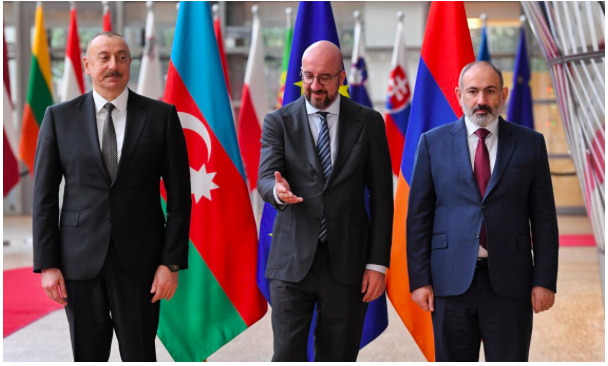
Photo Credit: European Union
The US as well as the EU as partners in diplomacy could have a significant impact on the policy direction. The EU has been an active broker trying to secure peace between Azerbaijan and Armenia hosting the head of states numerous times in trilateral meetings. However, these steps were challenged several times by the unilateral acts of Azerbaijan who often outspokenly criticized the EU diplomats and member states like France. On October 4, Ilham Aliyev refused to attend a joint meeting with Nikol Pashinyan in Spain.
On the other hand, the US has recently started to voice its concerns on this situation. In his meeting with US lawmakers, the Secretary of State Blinken signaled the halt of renewing the waiver of Section 907 of the Freedom Support Act banning “any kind of direct US military aid to Azerbaijan” which was passed by the US Congress in 1992. However, the amendment which was adopted by the Senate in 2001 enabled the White House to issue the waiver of Section 907 since 2002. The halt of the waiver could send a clear message to Azerbaijan. Analysts believe this political message could be more effective in terms of the US stance on the Azeri plans challenging the de facto in the Caucasus rather than its destructive effect over the loss of millions of dollars of assistance. According to the US Department of Defence (DOD), the US had provided about $800 million worth of aid to Azerbaijan of which 20% percent was military aid between 2002 and 2020.
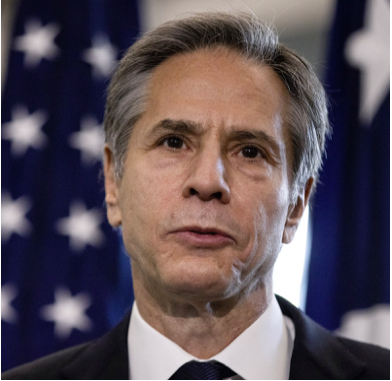
Photo Credit: CARLOS BARRIA / POOL / AFP
On 19 September 2023, the official statement by the Secretary of State voiced the concerns of the US over “Azerbaijan’s military actions in Nagorno-Karabakh” and called on “Azerbaijan to cease these actions immediately.” In the readout of his phone call with Armenian Prime Minister Pashinyan on 23 September 2023, Blinken reiterated “U.S. support for Armenia’s sovereignty, independence, and territorial integrity” and highlighted the US calls on “Azerbaijan to protect civilians and uphold its obligations to respect the human rights and fundamental freedoms of the residents of Nagorno-Karabakh and fundamental freedoms of the residents of Nagorno-Karabakh.” In another readout of a phone call between Blinken and Azeri President Aliyev provided by the Office of Spokesperson of Secretary of State on 26 September 2023, Blinken “emphasize the need for Azerbaijan to refrain from further hostilities in Nagorno-Karabakh and provide unhindered humanitarian access.









